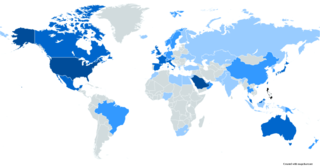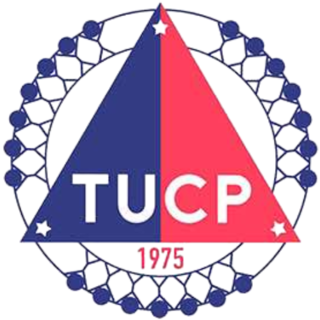
An overseas Filipino is a person of full or partial Filipino origin—i.e., people who trace back their ancestry to the Philippines but living or residing outside the country. This term generally applies to both people of Filipino ancestry and citizens abroad. As of 2019, there were over 12 million Filipinos overseas.

Overseas Filipino Worker (OFW) is a term often used to refer to Filipino migrant workers, people with Filipino citizenship who reside in another country for a limited period of employment. The number of these workers was roughly 1.77 million between April and September 2020. Of these, female workers comprised a larger portion, making up 59.6 percent, or 1.06 million. However, this number declined to 405.62 thousand between 2019 and 2020.

The Trade Union Congress of the Philippines (TUCP) is the largest national trade union center in the Philippines. Founded in 1975 by labor leader Democrito Mendoza, TUCP is affiliated with the International Confederation of Free Trade Unions and the International Trade Union Confederation.

Trade Union Congress Party is a party-list in the Philippines, set up by the Trade Union Congress of the Philippines as its electoral wing. The party contested the 2004 legislative elections, mustering 201,396 votes nationwide (1.58%). The list failed to win any seat. The Supreme Court declared TUCP, as well as a few other party-list organizations, as winners in the 2007 legislative elections by virtue of the Philippine Constitution.
Filipinos in the United Arab Emirates are migrants or descendants of the Philippines living in the United Arab Emirates. 679,819 Filipinos live in the UAE, of which 450,000 live in Dubai, and they form 6.1% of the whole UAE population, and they form 21.3% of the population of Dubai. Dubai is home to the largest population of Filipinos in the UAE, followed by Abu Dhabi and Al Ain. In 2007, Filipinos in the UAE sent more than US$500 million in remittances back to the Philippines.
Filipinos in Saudi Arabia are either migrants or descendants of the Philippines living in Saudi Arabia. Saudi Arabia is currently the largest hirer of Overseas Filipino Workers (OFWs), and has the largest Filipino population in the Middle East. Filipinos make up the fourth-largest group of foreigners in Saudi Arabia, and are the second-largest source of remittances to the Philippines.
Filipinos in Qatar are either migrants or descendants of the Philippines living in Qatar. Around 260,000 Filipinos live in Qatar, and frequently work in construction and service jobs. As of early 2017, Filipinos are estimated to be the fourth-largest group of foreign workers in Qatar, after Indians, Nepalis and Bangladeshis. With 56,277 Filipinos arriving between January and November 2008, Qatar is the third-largest destination of Overseas Filipino Workers (OFW's) in the Middle East after the United Arab Emirates and Saudi Arabia, and also the fourth-largest destination of OFW's worldwide. Despite this, and the removal of the Philippines from the pandemic-related travel-restriction "Red List" in August, 2022, Philippine nationals are unable to apply for Qatar tourist visas.
The labor migration policy of the Philippine government allows and encourages emigration. The Department of Foreign Affairs, which is one of the government's arms of emigration, grants Filipinos passports that allow entry to foreign countries. The Philippine government enacted the Migrant Workers and Overseas Filipinos Act of 1995 in order to "institute the policies of overseas employment and establish a higher standard of protection and promotion of the welfare of migrant workers and their families and overseas Filipinos in distress."

The Philippine Overseas Employment Administration (POEA) was an agency of the Government of the Philippines responsible for opening the benefits of the overseas employment program of the Philippines. It is the main government agency assigned to monitor and supervise overseas recruitment and manning agencies in the Philippines. The POEA's office is located at EDSA corner Ortigas Avenue, Mandaluyong, Philippines.

Iraq–Philippines relations refers to the bilateral ties between Iraq and the Philippines. Formal relations were established on January 12, 1975.

Roy Villareal Señeres was a Filipino politician and diplomat who initially ran in the 2016 Philippine presidential election under the Partido ng Manggagawa at Magsasaka party before withdrawing on February 5, 2016, three days before his death. Señeres was elected as a member of the Philippine House of Representatives representing the OFW Family Club party-list in the 2013 general elections. He is the father of former congressman Christian Señeres.

MariaSusana "Toots" Vasquez Ople is a Filipina politician and Overseas Filipino Workers' (OFW) rights advocate who is the first Secretary of the Department of Migrant Workers.

The Overseas Workers Welfare Administration is an attached agency of the Department of Migrant Workers of the Philippines. It protects the interests of Overseas Filipino Workers and their families, providing social security, cultural services and help with employment, remittances and legal matters. It is funded by an obligatory annual contribution from overseas workers and their employers. The agency was founded in 1977 as the Welfare and Training Fund for Overseas Workers. Its head office is at F.B. Harrison Street corner 7th Street in Pasay, near EDSA Extension, Philippines.

Kuwait–Philippines relations refers to the bilateral ties of Kuwait and the Philippines.
A diplomatic crisis began between the countries of Kuwait and the Philippines in early 2018 over concerns of the latter over the situation of Filipino migrant workers in the gulf country.
Throughout the COVID-19 pandemic, the national and local governments of the Philippines have coordinated numerous international and domestic evacuations.
The Overseas Filipino Workers (OFW) Hospital and Diagnostic Center, or simply the OFW Hospital, is a specialty hospital in San Fernando, Pampanga, Philippines. It is meant to cater to Filipino migrant workers.

The Department of Migrant Workers is the executive department of the Philippine government responsible for the protection of the rights and promote the welfare of Overseas Filipino Workers (OFW) and their families. The department was created under the Department of Migrant Workers Act that was signed by President Rodrigo Duterte on December 30, 2021. The functions and mandate of the Philippine Overseas Employment Administration (POEA) will serve as the backbone of the department and absorbing the seven offices of the Department of Labor and Employment (DOLE) and Department of Foreign Affairs (DFA) namely the Office of the Undersecretary for Migrant Workers' Affairs (OUMWA) of the DFA, Philippine Overseas Labor Office (POLO), International Labor Affairs Bureau (ILAB), National Reintegration Center for OFWs (NRCO) and the National Maritime Polytechnic (NMP) of the DOLE. The Overseas Workers Welfare Administration will serve as its attached agency and the DMW Secretary will serve as the concurrent Chairperson of OWWA.

Abdullah Derupong Mama-o is a Filipino government official who served as the ad interim Secretary of the Department of Migrant Workers under the Duterte administration.

The Death of Jullebee Ranara, an Overseas Filipino Worker in Kuwait, was established to have occurred after her body was found buried in the desert on January 21, 2023. She was reportedly raped, murdered, burnt and thrown in the desert. The death revived public discourse on the plight of Filipino migrant workers living in Kuwait.















